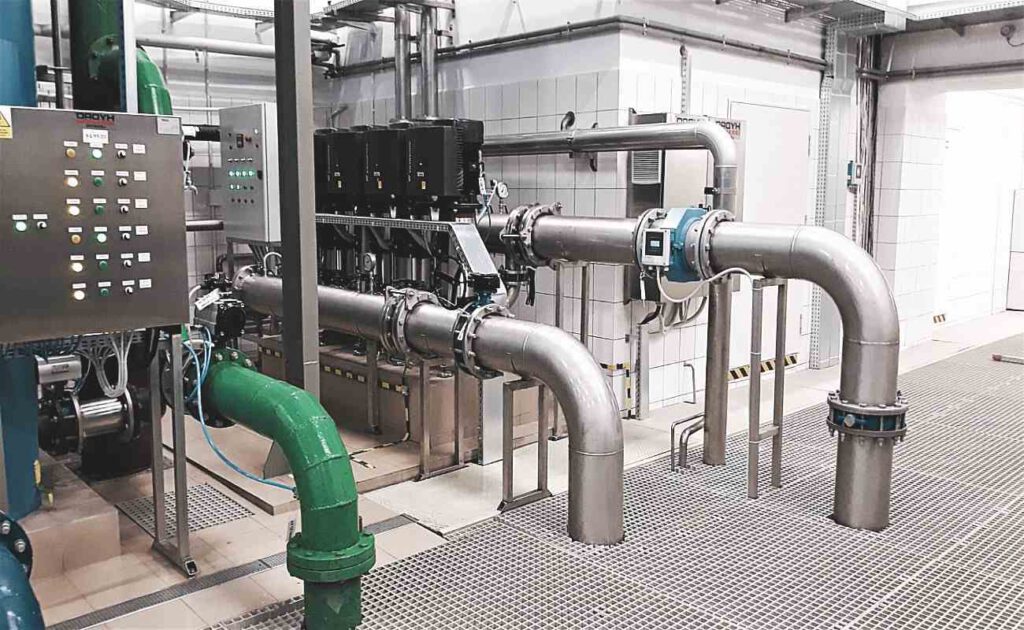Some of us drink tap water without a second thought, while others steer clear. The idea that tap water is unhealthy in Poland has left many wondering if it’s safe to drink and if the scale in the water is a threat.

The good news is that tap water in Poland is safe. The Chief Sanitary Inspector confirms: „Almost 99.7% of households are supplied with drinking water”. The fact that Polish tap water meets the standards of the Ministry of Health, the World Health Organization and even more stringent European Union regulations indicates that the water is safe to drink.
There is one exception from this rule when you should avoid drinking tap water. Please read further to learn more.
In the chemical stage, the water is analyzed for harmful substances; in the biological stage, it is tested for the presence of fungi, bacteria, and viruses. And to ensure its safety, biomonitoring is used, which involves monitoring live organisms that react to the presence of contaminants.
↳ PRO TIP: Do you like traveling? Then before you buy any ticket or book an attraction, check if it's available in this worldwide Viator Database. You may save a lot of money and time. No need to thank me :)
Quality of Tap Water in Poland
Currently, tap water in Poland is perfectly safe to drink, although its quality may vary depending on the location. Still, many people are concerned about drinking it, so they opt for bottled water or invest in water filters.
Tap Water Composition in Poland
According to the Department of Health in Poland, the composition of tap water is comparable to bottled water, and in many cases, it has a better mineral concentration. Tap water contains essential minerals such as calcium, magnesium, phosphorus, sodium, sulfur, copper and potassium that are beneficial to our bodies. The limescale buildup in the kettle that we often see as a sign of poor water quality is actually a result of the presence of calcium and magnesium.
It’s important to note that the concentration of minerals in tap water varies from place to place. The same is true for bottled water. Only a few brands of bottled water contain at least 1,000 milligrams of minerals per liter, which is the benchmark for „true” mineral water. In fact, tap water in cities like Krakow and Trójmiasto has even higher levels of magnesium and calcium than bottled water sold in stores.
Regulations and Standards for Tap Water in Poland
Today, water purification is a complex process that includes two types of filtrations – carbon and sand – followed by coagulation, ozonation or disinfection. The water is also tested for chemicals and potential hazards. In addition, biological departments are in charge of the testing for the presence of viruses, fungi, and bacteria.
Although there may be differences in quality depending on the source and treatment method, in general, you can safely drink straight from the tap. The water treatment process includes a number of steps, such as carbon and sand filtration, coagulation, ozonation, and disinfection.
Top quality tap water is available in Poland’s largest cities such as the Tri-City, Krakow, Poznan, Lodz, Warsaw and Katowice. But don’t worry, the people who live in the smaller towns and cities have not been forgotten.

Contamination of the water from the outside is a rare event, occurring in only 0.3% of the cases. You can drink it because it meets the standards set by the Ministry of Health. There are no health risks at all when drinking tap water, and bacteria will never get in – unless there is an emergency, which is announced and drinking tap water is banned.
Should I filter or boil water? Expert explains
According to an expert interviewed by TVN, boiling and filtering water are two different processes with different functions. Boiling is mainly used to disinfect and remove microorganisms, while prolonged boiling (about one minute of boiling) is used to get rid of chlorine.
On the other hand, filtration is mainly used to remove suspended solids, usually secondary contaminants that enter the water from corroded pipes. These two techniques are not substitutes for each other, as they serve different purposes and produce different results. Fortunately, since tap water in Poland is safe to drink, you can avoid both processes and feel safe drinking a glass of water straight from the tap. It is also a much more environmentally friendly choice than buying bottled water, and it helps reduce the amount of plastic waste.
Despite the fact that some people choose to use tap water, they are still concerned about drinking the water as it is. The survey conducted by TNS Poland showed: 18% of Poles usually filter their tap water. It may seem that this is the healthier option to choose. In reality, the process of cleaning and filtering tap water for drinking removes vital minerals. That is why experts recommend filtering water only when absolutely necessary. For example, if you want to get rid of an unpleasant odor in your water, a filter is worth using.
Recommendations for Drinking Tap Water
Drinking tap water is not only healthier for your body, it’s also better for the planet. The production of a single plastic bottle, which is often thrown away, releases 0.5 kg of carbon dioxide into the atmosphere and requires 26 liters of water. This is just the beginning of the PET bottle’s environmental impact. From the factory, it goes to water treatment facilities, followed by stores and supermarkets – all of which contribute to more pollution and energy use.
Finally, it usually ends up in forests, rivers and landfills. It can take hundreds of years to decompose. Did you know that in Poland, a staggering 3.6 billion single-use plastic bottles find their way to these places every year? In our lifetime and for many generations to come, it’s unlikely that any of these bottles will disappear.
Healt Benefits
The potential benefits far outweigh the potential losses when choosing to drink tap water. That’s because water contains essential elements that are easily absorbed by the body. These elements help the body function properly.
Calcium, which is essential for strong bones and teeth, and also helps protect muscles and joints, is one of the most important substances we absorb. It even helps keep the heart in good shape and can reduce inflammation. When there are adequate levels in the body, it helps boost immunity and can provide a sense of vitality and well-being.
Magnesium is also known for a variety of other benefits. It is known for its effects on the nervous system, can help reduce fatigue and improve physical performance, and is involved in regulating the body’s electrolyte balance.
When Should You Avoid Drinking Polish Tap Water?
Tap water is generally safe to drink and meets safety standards. However, there are certain circumstances where you should be cautious. In particular, if you live in a house with its own water source, such as a well, there is a chance that the water could be contaminated by various sources.
One of the main risks associated with well water is that it often becomes contaminated by agricultural runoff. This can occur when pesticides and other chemicals used in agriculture are washed into the water table. Such chemicals very often can make their way into the well. These substances, especially if consumed over a long period of time, can pose a significant threat to our health. Additionally, well water can be contaminated by fecal matter, such as manure, containing harmful bacteria and parasites.
The other potential risk associated with drinking well water is the presence of heavy metals, such as lead and arsenic. They can leach into the water table from a variety of sources, including industrial waste and naturally occurring minerals. In large concentrations, they can cause serious health problems.
Considering these risks, it’s important for you to take precautions when drinking well water. It’s a good idea to have the water tested regularly by the property owner to make sure it meets safety standards. You may consider filtration. My advice is not to drink such water at all.
Bibliography
- https://fit.poradnikzdrowie.pl/diety-i-zywienie/co-jesz/czy-mozna-pic-wode-z-kranu-aa-AKBP-1JSs-7uLG.html
- https://www.medonet.pl/czy-mozna-pic-wode-z-kranu–zalety-kranowki,artykul,19690248.html
- https://tvn24.pl/magazyn-tvn24/czy-mozna-pic-kranowke-sprawdzamy-co-plynie-w-rurach,207,3609
- https://upwr.edu.pl/aktualnosci/eksperci-upwr-czy-we-wroclawiu-mozna-pic-kranowke-3560.html



